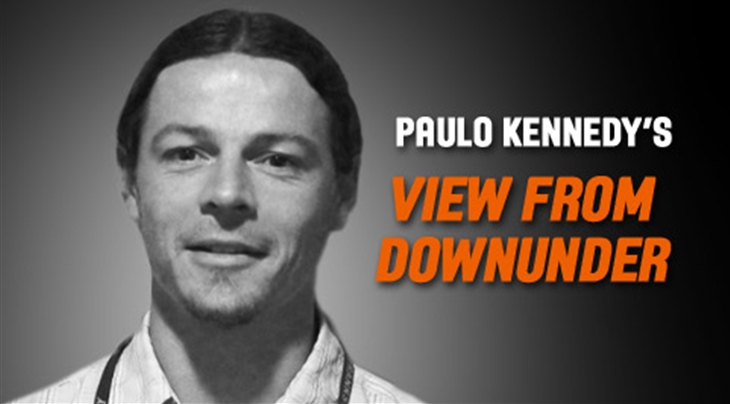
Those Aussie boys are doing it again
MELBOURNE (Paulo Kennedy's View from Downunder) - For those basketball junkies reading this from overseas, here's an insight into some of the basketball psyche that exists Downunder.
When the Boomers lost a practice game to "lowly" Finland in front of their mad fans in Helsinki, we had plenty of Aussies starting to question their team's chances at Spain 2014.
Never mind that it was the first week of practice games. Never mind that the Fins beat Slovenia, Greece, Russia and Turkey at last year's EuroBasket. Never mind they're considered an emerging force on the continent.
Nope, they're not a team we've heard of as a traditional power so any loss to them is a disaster.
Of course, it's not something to get too worked up about, in fact it kind of reminded me that rather than complaining about those who see only negatives, we should probably celebrate the achievements of Australian basketball a bit better.
A classic example is the current U17 team. It's easy to sit there and pick out their mistakes, forgetting they are just kids doing their absolute best in a tough and unfamiliar situation.
The reality is, for the third straight underage men's world championship, Australia is through to the final four after their impressive demolition of Puerto Rico.
This team is full of guts, as they showed in holding off a very strong Greek team.
Obviously the USA has dominated U17 and U19 tournaments for some time now, but the only other country that can top the Aussies' record in recent times is Serbia.
If you go back over the past nine tournaments, our junior men have ranked in the top six in all of them.
That's an incredible achievement and quite a reflection on the many coaches who have guided these young men, not the least because they are going on to make their mark at senior level.
From those nine teams have come eight of the current Boomers team.
A point that can easily be raised, however, is why haven’t our senior teams replicated this success?
Well for starters, two seventh-place finishes at the past two Olympics is something that shouldn't be underestimated. It isn't a brilliant performance, but it certainly isn't a failure either, it's a solid achievement.
The issue has been poor performances at the world cups in between, where the Boomers have lost in the round of 16.
For me, that cycle comes from not having a consistent identity.
Under Adrian Hurley and Barry Barnes the Boomers' style was understandably built around the shooting of Andrew Gaze. Those teams had success, but that style didn't suit the next generation.
Brian Goorjian at first implemented the style that had delivered him success in the NBL, overpowering halfcourt defence and post-orientated offence.
Of course, the majority of his players hadn't played that style, and the athletes at his disposal weren't superior to international competition like they were at domestic level.
Gradually over time, Goorjian's NBL coaching was influenced by the likes of Phil Smyth and Joey Wright, adding a more attacking element.
After a slow start in Beijing, this style beared some fruit for the national team, but then Goorjian was gone.
Brett Brown implemented a style based on tough half-court defence. But the Boomers couldn't score enough points in the slower game and Brown struggled with the nuances of the better teams' offences.
But come 2012 and progress had been made. After a slow start, the team showed off a more aggressive style and it beared some fruit, but then Brown was gone.
While all this was happening, Australia's junior teams were taking it up to the world's best tournament after tournament, consistently making it to the business end.
They did it playing with a mix of international patience and Aussie aggression, the way the kids had grown up playing with a helpful dash of sophistication added.
So how can we get that identity to work for us consistently at a senior level?
That's the daring task Andrej Lemanis has taken on as Boomers coach.
He's making his teams play that aggressive style and creating the read and react offensive identity that is so widespread in the NBL and around the world now.
He's sharing his offensive and defensive principles with not only junior national coaches, but junior coaches right around the country.
The idea is to create a national identity that suits our players and forms the basis of our national teams' play under successive coaches, even if they add their own twist.
Will it work? Well last week's losses to Lithuania and Finland showed there will be lumps. There always is when you try something new.
As I wrote last week, Lemanis has bitten off an even bigger mouthful by leaving some of his best defenders at home.
There is a reasonable likelihood we are going to have to experience another cycle of lesser performance at the world cup for something better at the Olympics.
The question is how low do we have to go in Spain and how high can that experience drive us in Rio?
With a new style and six new players this year, progressing to the top eight would be an achievement worth celebrating, and if things click on the right nights that could occur.
We'll see what happens with a talented but largely inexperienced group.
For now though, the U17 team are giving a pretty good demonstration of that style and the success that can be achieved, and that’s really worth celebrating.
Good luck against Spain in the Semi-Final boys!
Paulo Kennedy
FIBA
FIBA's columnists write on a wide range of topics relating to basketball that are of interest to them. The opinions they express are their own and in no way reflect those of FIBA.
FIBA takes no responsibility and gives no guarantees, warranties or representations, implied or otherwise, for the content or accuracy of the content and opinion expressed in the above article.


















